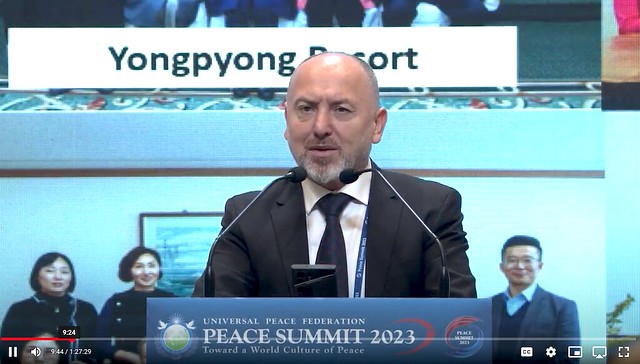Seoul, South Korea—A session of Peace Summit 2023 was devoted to UPF’s Interreligious Association for Peace and Development (IAPD).
Peace Summit 2023 took place from May 2 to 5 in the Lotte Hotel World (Jamsil Lotte Hotel) under the title “Toward a World Culture of Peace.”
The IAPD session was one of three concurrent sessions held at the end of the first full day, starting at 5:30 pm on May 3, 2023.
Dr. Tageldin Hamad, vice president of UPF International and international coordinator of IAPD, was the moderator. As a backdrop for the discussions, Dr. Hamad had arranged for a rolling display of slides showing IAPD events and programs in different parts of the world.
Eight speakers presented a range of perspectives; some of the major themes that emerged were the distinction between religion and spirituality; the importance of focusing on what we have in common; and the nature of good religious leadership.
Dr. Arben Suleimani from Albania, speaking on behalf of His Holiness Baba Mondi, world leader of the Bektashi Order, reminded us that the fundamental responsibility of religious leaders is to promote goodness, the God-given qualities in each person. This means to love God and to love and share with each other. "Man is not our enemy; he is our brother," Dr. Suleimani said. Our real enemy is the self, and selfishness in its many forms. We religious leaders cannot and must not allow human values to be lost, he said.
Archbishop George Stallings Jr. from the United States, the patriarch of the Imani Temple African American Catholic Congregation and the chair of IAPD-USA, said we each are called to be the tangible and visible presence of God on earth. But while God is the author of spirituality, religion is man-made: Essentially it is humanity trying to find our way back to our original purpose. This human construct is not itself perfect; our task is to make it good, Archbishop Stallings said. This means we have to respect each other and find and ultimately align with our common purpose.
Dr. Surinder S. Gill is the secretary general of the Sikhs of the United States. Emphasizing that peace and development go hand in hand, he listed among the main factors behind peace: stable government, a healthy business environment, fair distribution of resources, acceptance of the rights of others, good relations with neighbors, and the free flow of information. He called on all to rise above selfish interests and develop a sense of universal responsibility.
Hon. Dr. Mohamad Habash from United Arab Emirates, the chairman of the Human Fraternity Center and associate professor at Abu Dhabi University, spoke of his efforts under Syria's late Grand Mufti Sheikh Ahmad Kftarou to develop interfaith initiatives in Syria; and of his more recent efforts in the UAE with the Human Fraternity Center, which has one target: “How can we build one family under God?” Before coming to South Korea for the Peace Summit, he visited Taiwan "to connect with all religions and to find more in common between us."
Dr. Habash said, "We have to understand: If another person rejects your faith, that does not mean he is your enemy." The Prophet called for Islam but, as stated 14 times in the Koran, he said: "I came to continue what came before"—not to replace it!
Bhai Sahib Satpal, ambassador for the Sikh religion in the Western Hemisphere, spoke of Sikhism's message of universal brotherhood. While all religions call for peace, in reality religion is a factor in many conflicts. Yet it is we religious leaders who can turn this around by uniting. Unlike politicians, who come and go, religious leaders can come together with one voice, accepting and respecting diversity.
Pastor Juan Carlos Hasbun from El Salvador, the senior pastor of Kemuel Christian Church and a member of the Board of Directors of COICOM, an association of Latin American Christian communicators, spoke of the role that religion should play in building a culture of peace.
He outlined three areas of focus: First, faith and spirituality are of the greatest importance in the life of the individual, faced as we are with the many challenges of life. Second, faith provides us with principles and values that can guide our social interaction; in this way we can help others face challenges and develop capacities, giving them hope. Third, we can pass on our principles and values to the next generation; the legacy we leave is important in a world with more and more young people.
Rev. Dr. Cynthia Jackson from the United States, a district judge at the Jersey City Municipal Court, and the pastor of Allen AME Church, New Jersey, asked herself what peace would look like. We each can take time to figure out what we can do individually to make a difference, she said. Looking beyond our differences, be they political or religious, we should focus on the commonalities. "If each of us were cut, we would all bleed red. We each have family, friends and loved ones, and all have a vested interest in this thing called life."
The final speaker, Imboni Dr. Uzwi-Lezwe Radebe from South Africa, the founder and chair of the Revelation Spiritual Home, came straight to the point: "If religion was created by man, then spirituality should lead."
Citing UPF's own principles and the words of its founder, and referring to that human interconnectedness that is called Ubuntu, Dr. Radebe urged us all to live in harmony with our Creator, with a consciousness of the life hereafter. Spirituality permeates every aspect of life; everything is sacred; and we need constant consciousness of the divine, he said.
"The foundation of everything is spirituality,” Dr. Radebe said. “Spirituality shapes and gives meaning to the values we uphold. Politicians, religious leaders, business owners, leaders of social organizations, and all of society should drink from the fountain of spirituality."

